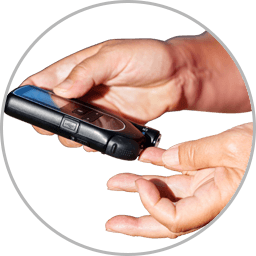Progress
Online First Aid | Fainting
Fainting, Hypoglycemia and Hyperglycemia
Fainting
Fainting is a brief period of time, usually less than a minute, when a person becomes unresponsive for a short period, and then seems fine. Fainting is often preceded by feelings of dizziness or light-headedness. Fainting may occur when someone:
- ● Stands without moving for a long time, especially in hot environments
- ● Has certain heart conditions
- ● Suddenly stands after squatting or bending over
- ● Receives bad or shocking news
If someone is dizzy and you suspect they may faint: Help the person lie flat on the ground. Call 9-1-1 if the person does not improve or becomes unresponsive.
If someone faints and becomes responsive
- ● Ask the person to lie flat on the floor until they feel normal and can sit up
- ● If the person fell, check for any injuries that may have been caused by the fall
If someone faints and is unresponsive
- ● Call 9-1-1 or activate EMS
- ● Begin CPR if necessary
Diabetes is an endocrine disorder that affects the levels of sugar in the blood. Excessively high blood sugar (hyperglycemia) or excessively low blood sugar (hypoglycemia) can cause problems. Some diabetics take medications like insulin to keep their blood sugar in a normal range.
Low blood sugar can occur if a person with diabetes does not eat, vomits, engages in too much physical activity for the amount of food they’ve eaten, or used too much insulin.
If the person can sit up and swallow
Ask them to eat or drink something with sugar that can quickly raise blood glucose levels. This includes glucose tablets, fruit juice, fruit leather, soft chew candy, or whole milk.
If the person can NOT sit up or swallow, do not force them. Instead:
Have them sit or lie down, quietly. If they do not improve within 15 minutes, call 9-1-1, or have someone else call.
Instructor: Mike Figuero
Publish Date: 2022-04-02
Last Updated: 2022-07-18
